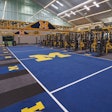Copyright 2018 The Evansville Courier Co.
All Rights Reserved
Evansville Courier & Press (Indiana)
Lisa Vassallo isn't just playing with her daughter when they shoot hoops together or share some yoga time in front of the television; this Manahawkin, N.J., mom knows that keeping her daughter moving is an important part of her physical as well as mental well-being.
The 37-year-old mom and her 10-year-old daughter have dance parties, walk trails near their home and come up with other ways to move their bodies.
Exercise for them is about more than physical health, Vassallo said; it gives their minds a rest, too.
"I think it's easy to fall into the trap of becoming addicted to electronics," she said. "They (children) are starting to learn on computers in school and then they come home, and they use their own tablets or their own iPods."
Experts agree that exercise has benefits that go beyond the physical.
Movement "stimulates your body. It stimulates your mind. It puts your psyche in a better place," said Dr. Margaret "Meg" Fisher, medical director of the Unterberg Children's Hospital at Monmouth Medical Center in Long Branch, N.J.
"People were meant to move. They were not meant to be sedentary," said Fisher, noting that children need at least an hour of intense physical activity daily, such as sports, a playground trip or dancing.
Yet, too few American children are getting enough exercise, according to the Centers for Disease Control. Less than three in 10 high school students in the U.S. get at least 60 minutes of physical activity daily, according to the CDC.
"As we've made the curriculum in schools tighter, and we've expected children to learn more, we've taken away some of the things where they used to get more activity," Fisher said.
In some cases, gym has been replaced with health classes and recess has been shortened, she said.
Exercise is important for all children, but especially for those with physical or developmental disabilities, said Kaylee McGuire, manager of community programs at Children's Specialized Hospital in Toms River, New Brunswick and Mountainside.
"We know that activity boosts mood," she said. "Children that are restricted from moving around and being active, you see it really affects their development, cognitively and physically."
Children in wheelchairs or on ventilators should still try different activities where they have a chance to move, such as playgroups, aquatics programs and open gyms, McGuire said.
Technology can be a friend rather than foe in terms of fitness, with games like Wii Fit and XBox Kinect, she said.
McGuire said these activities can help boost mood, confidence and self-esteem in all children, but especially ones with special needs.
Exercise has been shown to lower the risk of depression in children, according to a study published last year in the journal of Pediatrics by researchers at Norwegian University of Science and Technology.
Another study published in 2014 in Pediatrics found that students who participated in an after-school fitness program showed improved brain function compared with their peers, who did not participate.
Fisher said physical activity - especially free, unstructured play - helps children mature in important ways.
"When children are active, everything is better for them," she said. "(Even) their minds work better."
Read More of Today's AB Headlines
Subscribe to Our Daily E-Newsletter
Terms and Conditions Privacy Policy































